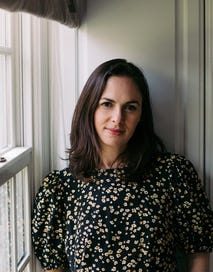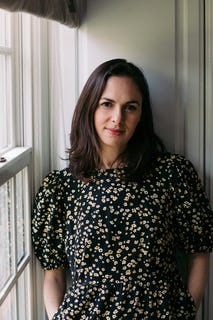Daisy Alpert Florin
On consent, the final semester of college, and the upside of consequences.
Intimate conversations with our greatest heart-centered minds.
On a cloudy afternoon as I was pondering how I seem to largely interview established writers and how lovely it would be to speak with a gifted debut writer, author Joanna Rakoff posted about one of her favorite new books: My Last Innocent Year by Daisy Alpert Florin. She described it as “gorgeous Wharton-esque realist fiction” and blurbed it as “unputdownable.” Which is, indeed, true.
In 1998, Isabel Rosen is in her final semester at Wilder College. She’s bright, beautiful, a talented writer, and somewhat uneasy in her life. Her mother, a free-spirited artist, died when Isabel was in high school; her father owns an appetizing store on the Lower East Side which sells dairy and fish. Although he works around the clock, he’s unable to make the sort of money Isabel’s classmates enjoy. As a result, Isabel feels like she never fits in anywhere.
Then, just before winter break, Isabel has a sexual encounter with her friend Zev that leaves her emotionally bruised. In the days before consent was given much credence, Isabel is uncertain about what happened, and before she finds her mental footing, events spin out beyond her control.
In the midst of this, her writing teacher, poet R.H. Connelly, takes a keen interest in both her prose and her. Once a darling of the literary world, Connelly, married, is now a newspaper reporter but recognizes the genius in Isabel. The two soon begin an affair. His elaborate praise both buoys and destabilizes Isabel, forcing her to reckon with parts of herself she’d carefully neglected. Through standing up to Connelly, Isabel learns to forgive her parents and ultimately herself for all the ways in which her life has not gone according to her dreams. And then she creates new dreams and moves toward those.
The writing is elegant, smooth, dreamy. The plot full of edge-of-your-seat twists and turns. These are characters who will stay with you long after you finish the book—as will the moral quandaries they face. Click “read excerpt” under the gorgeous cover image and you’ll see what I’m talking about!
Daisy attended Dartmouth College upon which Wilder is loosely based. She received graduate degrees from Columbia University and Bank Street Graduate School of Education. She was a recipient of the 2016 Kathryn Gurfein Writing Fellowship at Sarah Lawrence College and was a 2019–20 fellow in the BookEnds novel revision fellowship. Her essays have appeared in LitHub and Motherwell, amongst others. My Last Innocent Year was selected as A New York Times Book Review Editors' Choice and a USA Today Must-Read Book. A native New Yorker, Daisy lives in Connecticut with her family.
Throughout the novel you raise many questions about the role of consent within sexual encounters, both within Isabel’s experiences and those of secondary characters. Zev does not seek consent before they have sex. Connelly very explicitly asks for it. In the end, you don’t arrive upon any clear resolution although Isabel does say, “it [consent] existed somewhere along a vast continuum. The lines were there only until you crossed them.” What do you see as this continuum? And how do you think it’s evolved since the #MeToo Movement?
I’ve heard from women around my age, late forties, early fifties, who say that's how these things would happen back then and we didn’t know how to categorize them. I had an experience like Isabel’s, and it was something I really grappled with and still grapple with. Without being able to call it something, you end up turning a lot of the blame onto yourself.
Later in the book Isabel says, “I knew I would be the one always turning that night over and over in my head, wondering what could I have done differently? How could I have changed things?” I think that when you're a young woman who's raised to be highly socialized, like I was, you have a hard time making a fuss about something and storming out of a situation. You go along with it, just to get to the other side, and then figure you'll deal with it later.





